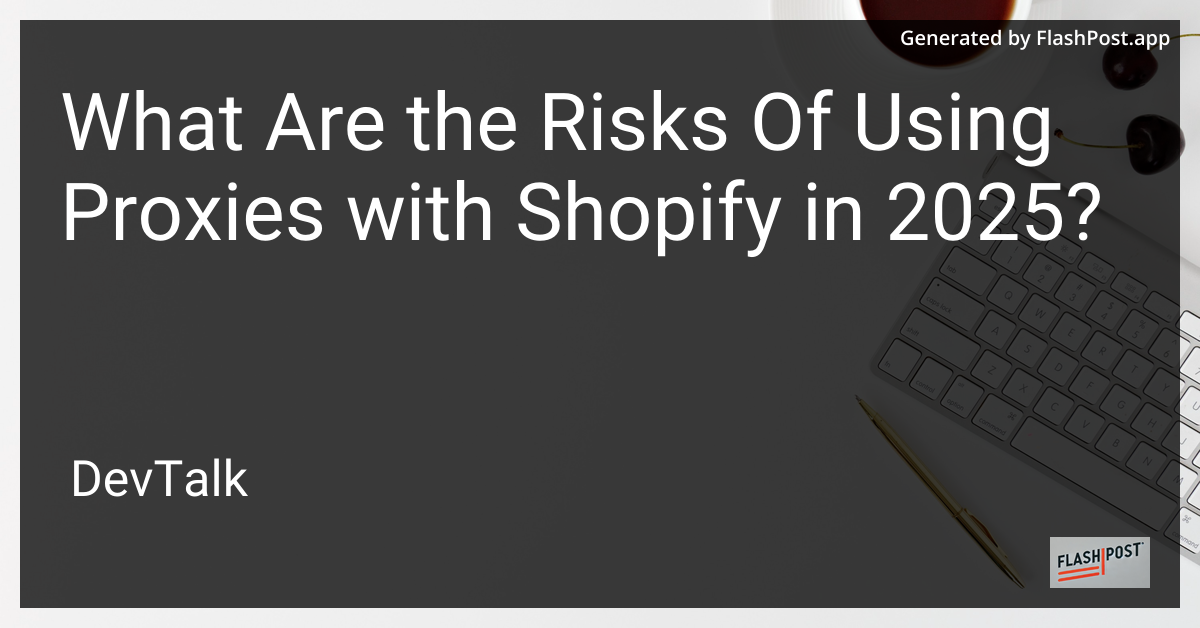What Are the Risks Of Using Proxies with Shopify in 2025?
 # What Are the Risks of Using Proxies with Shopify in 2025?
# What Are the Risks of Using Proxies with Shopify in 2025?
In the ever-evolving world of e-commerce, Shopify continues to be a popular platform for businesses seeking to establish or expand their online presence.
As digital landscapes become more competitive, many users turn to proxies to gain an edge. However, using proxies with Shopify is not without risks. This article explores potential dangers and provides insights for 2025.
What Are Proxies?
Firstly, for the uninitiated, proxies act as intermediaries between your device and the internet. They reroute your web requests, masking your IP address and making it appear as though you're browsing from a different location. This can be advantageous for various purposes, such as accessing geographically restricted content or automating certain tasks.
Why Use Proxies with Shopify?
- Bypass Geographic Restrictions: Merchants may use proxies to manage Shopify stores from different locations, bypassing geographic restrictions.
- Data Scraping: Businesses often leverage proxies to gather market intelligence by scraping competitor data, including prices and customer reviews.
- Automation: Proxies can facilitate the automation of tasks like updating inventories and processing orders without revealing the user's IP address.
Risks of Using Proxies with Shopify
While proxies offer certain benefits, using them with Shopify may expose users to various risks:
1. Account Suspension or Banning
One of the foremost risks associated with using proxies on Shopify is the potential for account suspension or banning. Shopify has strict policies against activities such as data scraping and using third-party tools that can violate their Terms of Service.

Risk Mitigation: It is crucial to stay compliant with Shopify's policies and use proxies cautiously, ensuring they do not contravene the platform's guidelines.
2. Data Security Threats
Proxies can pose significant security threats if not properly managed. Malicious proxies might expose sensitive data—including customer details and credit card information—to third parties.
Risk Mitigation: Always opt for reputable and transparent proxy service providers to safeguard sensitive information.
3. Performance Issues
Using proxies can lead to performance degradation. The added layer of communication might result in slower website load times, negatively impacting user experience and potentially hurting conversion rates.
Risk Mitigation: Test your proxy setup extensively to ensure it does not impact the speed and reliability of your Shopify store.
4. Legal Implications
Depending on the jurisdictions involved, using proxies could have legal implications, particularly if they are employed to scrape data or bypass geographical restrictions unlawfully.
Risk Mitigation: Seek legal guidance to ensure proxy usage aligns with local laws and Shopify's policies.
Conclusion
While proxies can offer valuable tools for managing and optimizing Shopify stores, they come with inherent risks that could affect your business. Understanding these risks and taking steps to mitigate them is essential for anyone considering proxy use in 2025.
For those exploring different types of proxies and their effectiveness, consider reading about Tiktok proxy servers. If you're focused on other platforms, you might find the Craigslist proxy testing guide useful. Additionally, understanding the difference between using a VPN and a proxy can be crucial for your business strategy; consider exploring gaming VPN vs proxy.
Stay informed and use proxies wisely to avoid pitfalls while capitalizing on their benefits!
Note: Ensure you comply with Shopify's Terms of Service and legal requirements when using proxies.